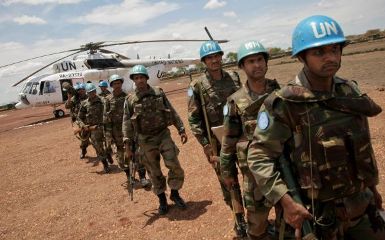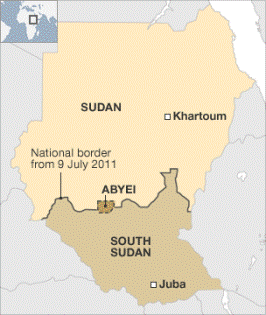Security Council urges Sudan, S. Sudan to withdraw troops from Abyei
March 19, 2014 (KHARTOUM) – The UN Security Council (UNSC) has demanded that South Sudan and Sudan immediately withdraw their troops from Abyei, saying it has grave concerns over the volatile security and humanitarian situation in the contested oil-producing region.

In a separate report to the council last month, UN secretary-general Ban Ki-Moon said the United Nations Interim Security Force for Abyei (UNISFA) had confirmed the presence of more than 600 officers from the South Sudan army (SPLA) and national police service, while up to 150 Sudanese Oil Police were observed in the Diffra oil complex in northern Abyei and other areas.
The UNSC says the presence of armed groups is a clear violation of a 20 June 2011 agreement signed by both countries, which declared Abyei a weapons free area.
The agreement outlined temporary arrangements for the security and administration of Abyei, and stipulated the redeployment of all Sudanese and South Sudanese forces out of the area and the disarmament of militia elements.
However, UNISFA says several hundred South Sudanese security personnel, deployed to the area ahead of a unilateral referendum in October 2013 to decide the fate of the region, remain in Abyei.
It says some army and police units in the country had established military-type settlements and are heavily armed with AK-47 rifles and anti-tank rocket propelled grenades.
It says repeated requests to the South Sudan government to redeploy its forces have so far been ignored, with the heavy military presence posing a major security risk to the Arab Misseriya nomads migrating through the area.
Ban says the conflict in South Sudan is also directly impacting on Abyei. As both governments shift their focus to the crisis there, agreement negotiations have stalled, leading to increased tensions and a higher risk of violence in the region.
According to UNISFA, sporadic incidents involving unauthorised armed groups in the area had led to in civilian casualties and displacement, with the situation on the ground remaining unpredictable.

On Monday, the SPLA claimed the Sudanese army (SAF) and their armed militia are planning to invade and take control of the contested border region of Abyei following repeated attempts to breach a buffer zone established by UNISFA.
A South Sudanese government official confirmed that Sudanese forces had attempted to enter from the west and east of Abyei, but had been repulsed on both occasions by UNISFA.
South Sudan says claims by Khartoum that its troops are active in Abyei is a political ploy designed to shift attention away from its own activities on the ground.
The UNSC, meanwhile, has reiterated calls for both Sudan and South Sudan to resume unconditional negotiations on the final status of Abyei and to commit to the establishment of a demilitarised border zone.
It also called on both countries to move forward with implementing pending aspects of the 2011 agreement, including the establishment of an area administration and council and police service.
The status of Abyei, which is considered strategically important to both Sudan and South Sudan for its oil resources and fertile agricultural land, has remained deadlocked after a planned referendum to decide the future of the region never went ahead due to disagreement over who was eligible to vote.
Khartoum is pushing for the Misseriya, who enter the area periodically to graze their cattle, to be allowed to take part, whereas Juba maintains that only the Ngok Dinka, as permanent residents of the area, are eligible vote.
In October last year, the Southern-aligned Ngok Dinka went ahead with a unilateral vote in which they almost unanimously opted to join South Sudan, although the results have not been formally recognised by either country.
(ST)
